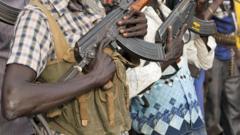As South Sudan faces a perilous situation with renewed armed conflict, the UN has reported that airstrikes deploying barrel bombs—potentially containing a hazardous, flammable substance—are compounding an already dire humanitarian crisis. The remarks by UN mission leader Nicholas Haysom signal a foreboding warning about the fragility of peace established since the 2018 accord, which ended a five-year civil war.
UN Warns of Imminent Civil War as Barrel Bombs Strike South Sudan

UN Warns of Imminent Civil War as Barrel Bombs Strike South Sudan
The United Nations expresses grave concern over escalating violence in South Sudan following recent airstrikes using barrel bombs amidst a resurgence of conflict.
The article text follows.
The ongoing turmoil in South Sudan has reached alarming levels with the UN reporting the use of barrel bombs believed to contain a highly flammable liquid in airstrikes against civilians. Nicholas Haysom, head of the UN mission in South Sudan, conveyed fears of a potential resurgence of civil war as clashes erupt between government forces and the rebel group known as the White Army in the northern town of Nasir, part of the oil-rich Upper Nile State.
Haysom's statements come in the wake of increasing violence after the White Army took over a military base, leading to ongoing aerial bombardment that has inflicted "significant casualties and horrific burns" on the population. "A conflict would erase all the hard-won gains made since the 2018 peace deal was signed," he warned, emphasizing the potential devastation not only for South Sudan but for the broader region as well.
While the government has yet to respond to these serious allegations, the relationship between President Salva Kiir and Vice-President Riek Machar has become increasingly strained in recent years, marred by ethnic tensions and sporadic hostilities since their initial peace agreement. In a move that ignited further controversy, top allies of Machar were arrested earlier this month, and accusations of aerial assaults targeting civilian areas began to surface.
Local leaders, including county commissioner James Gatluak Lew, have reported chemical attacks conducted by state forces, claiming that ethyl acetate, a known accelerant, was discovered at the bombing sites. The government spokesperson contended that military actions were strictly aimed at White Army positions and not civilians. Nevertheless, Haysom refuted these claims, noting that approximately 63,000 people have been displaced amid the violence.
As the nation inches toward elections next year, Haysom highlighted the further exacerbation of tensions fueled by rampant misinformation and hate speech, which are intensifying ethnic divisions. To address this volatile situation, the UN mission, which oversees around 18,000 peacekeepers in South Sudan, is imploring intense diplomatic efforts to safeguard against a descendant into another civil war.
In a related development, Machar has accused Uganda of violating the UN arms embargo by conducting airstrikes in support of the South Sudan government against rebel factions. A letter from Machar to international bodies accused Ugandan forces of attacking civilians in various regions of South Sudan, further complicating an already troubled peace process. Uganda has dismissed the allegations, stating its military involvement was at the behest of the Kiir administration.
As the crisis continues to unfold, the international community remains vigilant, hoping to avert what could become a catastrophic conflict in the world's youngest nation.
The ongoing turmoil in South Sudan has reached alarming levels with the UN reporting the use of barrel bombs believed to contain a highly flammable liquid in airstrikes against civilians. Nicholas Haysom, head of the UN mission in South Sudan, conveyed fears of a potential resurgence of civil war as clashes erupt between government forces and the rebel group known as the White Army in the northern town of Nasir, part of the oil-rich Upper Nile State.
Haysom's statements come in the wake of increasing violence after the White Army took over a military base, leading to ongoing aerial bombardment that has inflicted "significant casualties and horrific burns" on the population. "A conflict would erase all the hard-won gains made since the 2018 peace deal was signed," he warned, emphasizing the potential devastation not only for South Sudan but for the broader region as well.
While the government has yet to respond to these serious allegations, the relationship between President Salva Kiir and Vice-President Riek Machar has become increasingly strained in recent years, marred by ethnic tensions and sporadic hostilities since their initial peace agreement. In a move that ignited further controversy, top allies of Machar were arrested earlier this month, and accusations of aerial assaults targeting civilian areas began to surface.
Local leaders, including county commissioner James Gatluak Lew, have reported chemical attacks conducted by state forces, claiming that ethyl acetate, a known accelerant, was discovered at the bombing sites. The government spokesperson contended that military actions were strictly aimed at White Army positions and not civilians. Nevertheless, Haysom refuted these claims, noting that approximately 63,000 people have been displaced amid the violence.
As the nation inches toward elections next year, Haysom highlighted the further exacerbation of tensions fueled by rampant misinformation and hate speech, which are intensifying ethnic divisions. To address this volatile situation, the UN mission, which oversees around 18,000 peacekeepers in South Sudan, is imploring intense diplomatic efforts to safeguard against a descendant into another civil war.
In a related development, Machar has accused Uganda of violating the UN arms embargo by conducting airstrikes in support of the South Sudan government against rebel factions. A letter from Machar to international bodies accused Ugandan forces of attacking civilians in various regions of South Sudan, further complicating an already troubled peace process. Uganda has dismissed the allegations, stating its military involvement was at the behest of the Kiir administration.
As the crisis continues to unfold, the international community remains vigilant, hoping to avert what could become a catastrophic conflict in the world's youngest nation.



















